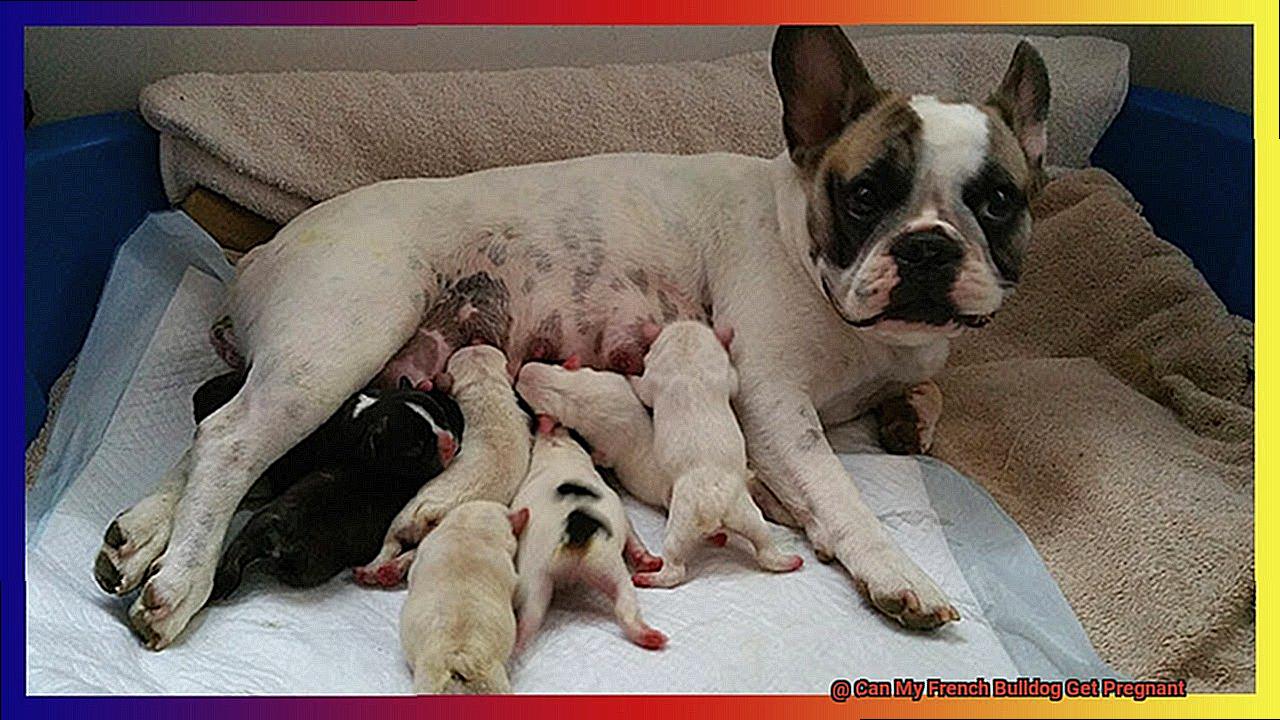Can My French Bulldog Get Pregnant?
I bet you’ve found yourself wondering at some point: can my French Bulldog get pregnant? We all know that dogs can have puppies, but when it comes to our unique little Frenchies, things might not be as simple as we think.
In this blog post, we’re going to dig deep into the fascinating world of French Bulldog reproduction. We’ll give you all the juicy details and factual information about what affects their ability to conceive. Whether you’re an eager owner-to-be or just a curious enthusiast, get ready for a blend of casual conversation and expert knowledge. So let’s jump right in and unravel the mystery that’s been bugging every Frenchie lover out there.
Factors to Consider Before Breeding a French Bulldog
Contents
- 1 Factors to Consider Before Breeding a French Bulldog
- 2 Age Requirements for Breeding French Bulldogs
- 3 Health Considerations When Breeding a French Bulldog
- 4 Genetic Testing for Breeding French Bulldogs
- 5 Choosing the Right Mate for Your Female French Bulldog
- 6 Preparing For Responsibilities of Breeding a French Bulldog
- 7 Pre-Natal Care for Female French Bulldogs
- 8 Monitoring During Pregnancy and Delivery of Puppies
- 8.1 Tracking Pregnancy Progress: Aye, Aye Captain.
- 8.2 Balanced Diet: Food Fit for a Queen.
- 8.3 Moderate Exercise: Smooth Sailing, Not Rough Waters.
- 8.4 Ahoy. Behavioral Changes Ahead.
- 8.5 Prepare the Whelping Area: Safe Harbor for Delivery.
- 8.6 Keep an Eye on Labor: Heave Ho, Puppies Ahoy.
- 8.7 Puppies Ahoy. Monitoring Their Health:
- 9 Conclusion
Breeding a French Bulldog is an exciting but serious decision that requires careful consideration. To ensure the health and well-being of your dog and the success of the breeding process, there are several important factors to take into account. In this article, we will explore these factors in detail, providing valuable insights based on first-hand knowledge and experiences.
Age and Health:
- Wait until your French Bulldog is at least two years old before breeding to ensure their physical and mental maturity.
- Conduct thorough health screenings and genetic testing to ensure your dog is free from hereditary or genetic diseases that can be passed on to the offspring.
- Consult with a veterinarian to assess your dog’s overall health before proceeding with breeding.
Temperament:
- Breeding dogs with stable, friendly, and well-balanced temperaments is crucial for producing puppies with desirable traits.
- Assess your dog’s temperament through professional evaluation or observation in different situations.
- Avoid breeding aggressive or overly anxious dogs to prevent behavioral problems in the offspring.
Breed Standards:
- Familiarize yourself with the breed standard for French Bulldogs, including body proportions, head shape, coat color, and size requirements.
- Breeding should aim to improve the breed’s overall health, structure, and appearance.
- Breeding without adhering to these standards can result in puppies that do not meet the desired characteristics or may have health issues.
Financial Readiness:
- Breeding French Bulldogs can be a costly endeavor.
- Consider expenses such as veterinary care, health testing, prenatal and postnatal care for the mother, and potential cesarean sections during delivery.
- Ensure you have the financial means to provide proper care throughout the entire breeding process.

Suitable Homes for Puppies:
- Have a plan in place for finding loving and responsible owners for each puppy.
- Screen potential adopters and ensure they understand the responsibilities of owning a French Bulldog.
- Consider maintaining a waiting list or carefully selecting appropriate homes to ensure the well-being of the puppies.
Age Requirements for Breeding French Bulldogs
French Bulldogs, known for their charming personalities and distinctive appearance, require careful consideration when it comes to breeding. In this section, we will explore the age requirements for breeding French Bulldogs to ensure the well-being of both the mother and the puppies.
Sexual Maturity:
French Bulldogs typically reach sexual maturity between 6 to 9 months of age. However, it is generally recommended to wait until they are at least 1 year old before considering breeding. This allows their bodies to fully mature and reduces the risk of health complications during pregnancy and nursing.
Health Risks:
Breeding a female French Bulldog too young can pose health risks for both the mother and the puppies. Their bodies may not be fully developed to handle the demands of pregnancy and nursing, resulting in stunted growth and weaker puppies.
Upper Age Limit:
While there is no strict upper age limit for breeding French Bulldogs, female dogs typically reach menopause around 8 years old. Breeding a female dog past her prime can increase the risk of complications during pregnancy and delivery.
Male Fertility:
Male French Bulldogs can be bred throughout their entire lives as long as they remain healthy and fertile. However, older males may have a decreased sperm count or fertility issues, which can affect their ability to successfully impregnate a female.
Consultation with Professionals:

Before making any decisions regarding breeding, it is crucial to consult with a veterinarian or a professional breeder who specializes in French Bulldogs. They can provide guidance on the appropriate age for breeding based on the individual dog’s health, temperament, and breed standards.
Health Considerations When Breeding a French Bulldog
Breeding a French Bulldog requires careful consideration of their health. These charming canines have unique anatomy and genetic predispositions that make them prone to certain health issues. To ensure a successful and healthy breeding journey, it is essential to take the following health considerations into account:
- Respiratory Health: French Bulldogs have a brachycephalic (short-nosed) structure, which can lead to respiratory difficulties. It is crucial to ensure that both the male and female French Bulldogs have good respiratory health before attempting to breed them. This will help prevent complications during strenuous activities like mating or giving birth.
- Genetic Background: Choose breeding dogs that are free from hereditary diseases and have undergone thorough health screenings. These screenings should include evaluations for hip and elbow issues, eye examinations, and genetic testing for common conditions like hip dysplasia, patellar luxation, and brachycephalic syndrome. By selecting healthy dogs with clean genetic backgrounds, you can minimize the risk of passing on these health issues to future generations.
- Reproductive Issues: French Bulldogs are prone to reproductive problems such as infertility and difficulty conceiving naturally. These issues can be attributed to hormonal imbalances, structural abnormalities in the reproductive organs, or previous medical conditions. Consulting with a veterinarian who specializes in canine reproduction can help identify any potential reproductive issues and provide guidance on breeding options.
- Nutrition: Proper nutrition plays a vital role in maintaining the overall health and reproductive capacity of a French Bulldog. Ensure that the breeding dogs are receiving a balanced diet that meets their nutritional needs before, during, and after breeding. Consult with a veterinarian or a canine nutritionist to ensure appropriate nutrition.
- Optimal Breeding Age: The age of the French Bulldog influences their ability to reproduce successfully. Female French Bulldogs are typically at their prime for breeding between the ages of two and five years. Breeding them before or after this optimal age range can increase the risk of complications during pregnancy or delivery. Male French Bulldogs should be at least one year old before being used for breeding to ensure their reproductive organs have fully developed.
- Well-being and Comfort: It is crucial to consider the overall well-being and comfort of the French Bulldog during the breeding process. Breeding should never be forced or rushed, and both dogs should be given ample time to adjust and form a natural bond. Monitoring their behavior and stress levels is essential to prevent any potential health issues or complications during breeding.
Genetic Testing for Breeding French Bulldogs
French Bulldogs are undeniably adorable with their signature bat ears and playful personalities. However, behind those cute faces, there are certain genetic predispositions that breeders need to be aware of.
Genetic testing plays a crucial role in responsible French Bulldog breeding, as it helps identify potential health issues that can be passed on to future generations. Let’s dive into why genetic testing is so important for these lovable pups.

Identifying Genetic Conditions
French Bulldogs are prone to certain genetic conditions, including brachycephalic syndrome, degenerative myelopathy, and hip dysplasia, among others. Genetic testing allows breeders to determine if their French Bulldogs carry any of these conditions, enabling them to make informed decisions about breeding. It’s like having a crystal ball that reveals potential health risks.
Specific Genetic Tests
One common genetic test for French Bulldogs is the DNA test for brachycephalic syndrome. This test checks for the presence of certain genes associated with respiratory issues, which are prevalent in brachycephalic breeds like the French Bulldog. By knowing a dog’s genetic status for this condition, breeders can make educated choices about pairings to minimize the risk of respiratory problems in their offspring.
Another important genetic test is for degenerative myelopathy, a neurological disorder that affects the spinal cord. This test helps identify dogs that are carriers or at risk of developing the condition. By avoiding breeding dogs with this genetic predisposition, breeders can significantly reduce the chances of passing on degenerative myelopathy to future generations.
Additionally, breeders may consider conducting hip evaluations through x-rays to identify any signs of hip dysplasia. This common concern in French Bulldogs can cause pain and mobility issues. By screening breeding dogs for hip dysplasia, breeders can avoid pairing individuals with a higher risk of passing on this condition.
General Health Screenings
In addition to specific genetic tests, breeders may also opt for general health screenings. These screenings assess the overall well-being of French Bulldogs and can identify any underlying health conditions that may impact breeding decisions. It’s all about ensuring the best possible start for each new generation of Frenchies.
Understanding the Limitations
It is important to note that genetic testing should not be seen as a guarantee that a French Bulldog will never develop any health issues. While it provides valuable information, it does not eliminate all risks. However, it allows breeders to make responsible breeding decisions based on a dog’s genetic profile.
Working with Professionals
Breeders should work closely with veterinarians and geneticists to interpret the results of genetic tests and develop a breeding plan that prioritizes the health and well-being of the breed. These experts can provide guidance and help navigate through the complexity of genetic testing.
Choosing the Right Mate for Your Female French Bulldog
As an expert in the world of French Bulldogs, I understand how important it is to choose the right mate for your female Frenchie. Breeding is a big responsibility and selecting the perfect partner can make all the difference in the health and quality of the puppies. So, let’s dive into what factors you should consider when making this important decision.
- Breed Standard: It’s crucial to ensure that both the male and female are purebred French Bulldogs. This ensures that the offspring will possess the desired traits and characteristics of the breed. If you plan on showing or participating in dog competitions, breeding with another purebred Frenchie is a must.
- Health and Genetic Background: Your furry friends’ health should be a top priority. Before breeding, both dogs should undergo thorough health screenings to rule out any hereditary diseases or conditions that could be passed on to their precious pups. Consult with a veterinarian or reputable breeder who has experience in breeding French Bulldogs for guidance.
- Compatibility: Just like humans, dogs need to get along. Observe how the potential mates interact with each other. Look for signs of aggression or dominance issues as this can lead to problems during breeding. A harmonious relationship between the two dogs will contribute to a successful mating process.
- Age Matters: The age of both dogs is an important consideration. Ideally, your female Frenchie should be at least two years old before breeding her for the first time. This allows her body to fully develop and reduces the risk of complications during pregnancy and delivery. As for the male, he should also be of a similar age or slightly older.
- Breeding Contract: To ensure a smooth process, it’s essential to have a breeding contract in place before mating. This contract should outline responsibilities and expectations for both parties involved, including stud fees, ownership rights, and any potential co-ownership arrangements for the resulting puppies.
Breeding your French Bulldog should be a well-thought-out decision that prioritizes the health and well-being of both the female and the puppies. By considering factors like breed standard, health and genetic background, compatibility, age, and having a breeding contract in place, you can increase the chances of producing healthy offspring that adhere to the breed standard and possess desirable traits.
Preparing For Responsibilities of Breeding a French Bulldog
You’re thinking about breeding your French Bulldog? That’s an exciting endeavor, but it’s important to approach it with responsibility and care. Breeding a French Bulldog is not as simple as putting two dogs together and waiting for the magic to happen. It requires thorough preparation and consideration of various factors. Here are some key steps to help you prepare for the responsibilities of breeding a French Bulldog:
- Ensure Optimal Health: Before breeding your French Bulldog, it’s crucial to ensure that she is in optimal health. Regular veterinary check-ups, vaccinations, and genetic testing are essential to rule out any underlying health issues or hereditary conditions that could be passed on to the puppies.
- Research Breed Standards: Familiarize yourself with the breed standards and specific traits of French Bulldogs. This will help you select a suitable mate that complements your dog’s traits and enhances the breed’s overall quality. Seek advice from experienced breeders or join local French Bulldog clubs to gain valuable insights.
- Create a Suitable Environment: Prepare a clean and comfortable space for your French Bulldog to whelp and care for her puppies. Provide proper nutrition, including a balanced diet and necessary supplements, to support the health and development of both the mother and the puppies.
- Financial Considerations: Breeding can be an expensive endeavor. Be prepared for veterinary expenses, genetic testing, prenatal care, whelping supplies, and potential emergencies. Have a budget in place to ensure that you can afford all necessary expenses associated with breeding.
- Be Prepared for Complications: Educate yourself about the signs of distress or complications that may arise during pregnancy or delivery. Have a trusted veterinarian on standby who is experienced in canine reproduction and can provide guidance and support throughout the breeding process.


Pre-Natal Care for Female French Bulldogs
Ahoy, fellow French Bulldog enthusiasts. If you’re planning on breeding your precious Frenchie, it’s time to batten down the hatches and prepare for pre-natal care. Just like a skilled captain, you want to ensure a smooth sailing journey for your furry mate. Let’s dive into the importance of pre-natal care and how to provide the best support for your expecting Frenchie.
- Consultation with a Veterinarian: Avast, mateys. Before your Frenchie takes the plunge into parenthood, consult with a veterinarian to assess her health. They’ll help determine if she’s ready for the voyage and advise you on any necessary precautions.
- Optimal Health: Arrr, me hearties. Your Frenchie lass needs to be in top-notch health before mating. Make sure she’s up to date on vaccinations, free from parasites, and doesn’t have any underlying health conditions that could make her journey treacherous.
- Nutritious Diet: Yo-ho-ho. Once your Frenchie is confirmed pregnant, feed her a balanced and nutritious diet fit for a queen. A high-quality dog food designed for pregnant or nursing dogs will provide her with the nutrients she needs to nourish her growing crew.
- Smaller Meals: Shiver me timbers. As her belly expands, feeding smaller meals throughout the day can help alleviate any discomfort she may feel.
- Moderate Exercise: Avast ye scurvy dogs. Regular exercise is still important during pregnancy, but avoid any strenuous activities or excessive exercise that could put strain on her growing belly.
- Rest and Relaxation: All hands on deck. Provide your expecting mother with a cozy and quiet space where she can rest undisturbed. She needs plenty of RandR to prepare for the arrival of her little rascals.
- Regular Vet Check-ups: Aye, aye, captain. Regular visits to the veterinarian during pregnancy will help monitor the progress of the pregnancy and address any concerns or potential complications.
- A Safe Birthing Area: Prepare the crow’s nest. Set up a whelping box or area where your Frenchie can comfortably give birth. It should be clean, warm, and easily accessible for both mom and puppies.
- Monitoring Body Temperature: Yo ho ho and a bottle of rum. Keep an eye on your Frenchie’s body temperature as it may drop in the days leading up to labor, signaling that the treasure is about to be born.
- 10. Educate Yourself: Avast, me hearties. Learn about the signs of labor and what to expect during the birthing process. Have emergency contact information ready for your veterinarian or a reproductive care clinic in case you encounter any rough waters.
Monitoring During Pregnancy and Delivery of Puppies
If you’re planning on breeding your precious Frenchie, it’s time to batten down the hatches and prepare for pre-natal care. Just like a skilled captain, you want to ensure a smooth sailing journey for your furry mate. Let’s dive into the importance of monitoring during pregnancy and delivery for French Bulldogs.
Tracking Pregnancy Progress: Aye, Aye Captain.

Regular veterinary check-ups are crucial to monitor your Frenchie’s pregnancy progress and detect any potential complications. These check-ups will help track your mate’s weight, ensure proper nutrition, and identify any signs of distress or abnormalities. Arrr, matey, remember to walk the plank towards your vet around 25 to 30 days after mating for an ultrasound to confirm the pregnancy and estimate the litter size.
Balanced Diet: Food Fit for a Queen.
Just like a pirate needs a balanced diet to keep sailing, your pregnant Frenchie needs high-quality, nutrient-dense food specially formulated for pregnant or nursing dogs. Keep her belly full with meals that provide all the essential nutrients she needs to support her own health and the healthy development of her puppies.
Moderate Exercise: Smooth Sailing, Not Rough Waters.
While it’s important for your mate to stay active during pregnancy, excessive strain on her body can lead to complications. Avoid strenuous activities or anything that may cause trauma.
Instead, opt for short walks and mild activities that keep her moving without putting undue stress on her body.
Ahoy. Behavioral Changes Ahead.
Just like a ship changes its course during a storm, your Frenchie’s behavior may change during pregnancy. She might exhibit nesting behaviors, become more affectionate or protective, or experience mood swings. Create a calm and stress-free environment for her to navigate these changes smoothly.
Prepare the Whelping Area: Safe Harbor for Delivery.
As the due date approaches, create a comfortable whelping area for your mate to give birth. Set sail for success by providing a warm, quiet, and distraction-free space. A nesting box with clean bedding will provide a safe and secure spot for her to bring her puppies into the world.
Keep an Eye on Labor: Heave Ho, Puppies Ahoy.
During labor, observe your mate closely for any signs of distress or complications. While French Bulldogs generally give birth without assistance, occasionally they may require veterinary intervention. Keep an eye out for prolonged contractions without progress, excessive bleeding, or signs of exhaustion.
Puppies Ahoy. Monitoring Their Health:
After each puppy is born, weigh them regularly to ensure they are gaining weight and nursing properly. If you notice any concerns, don’t hesitate to seek guidance from your veterinarian. They’ll help make sure your little ones are on the right track.
Conclusion
In conclusion, it is important to understand that yes, your French Bulldog can indeed get pregnant.
However, there are several factors to consider before allowing breeding to occur. It is crucial to consult with a veterinarian and ensure the health and well-being of both the female and male dogs involved.
Additionally, responsible breeding practices should be followed to avoid any potential complications or risks.




